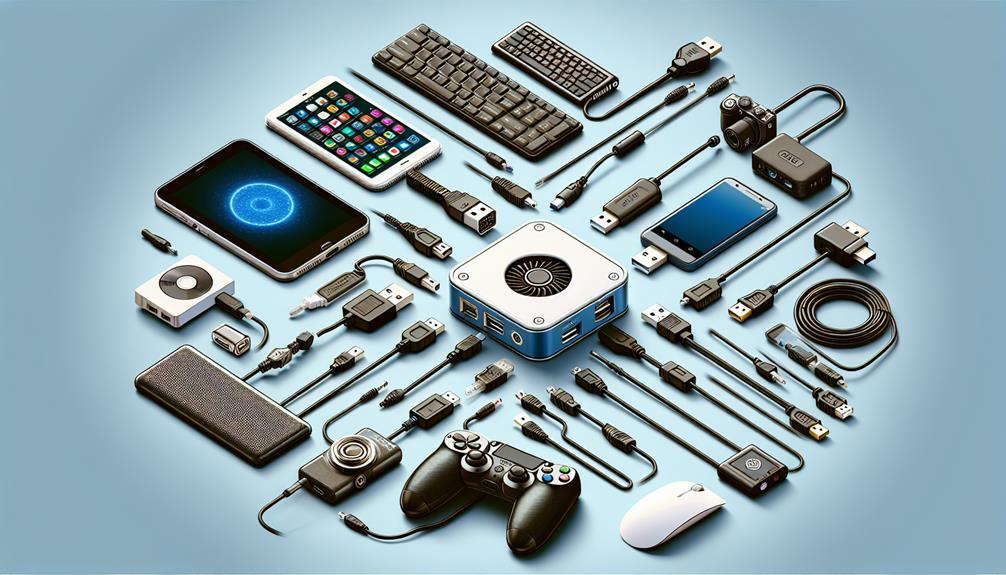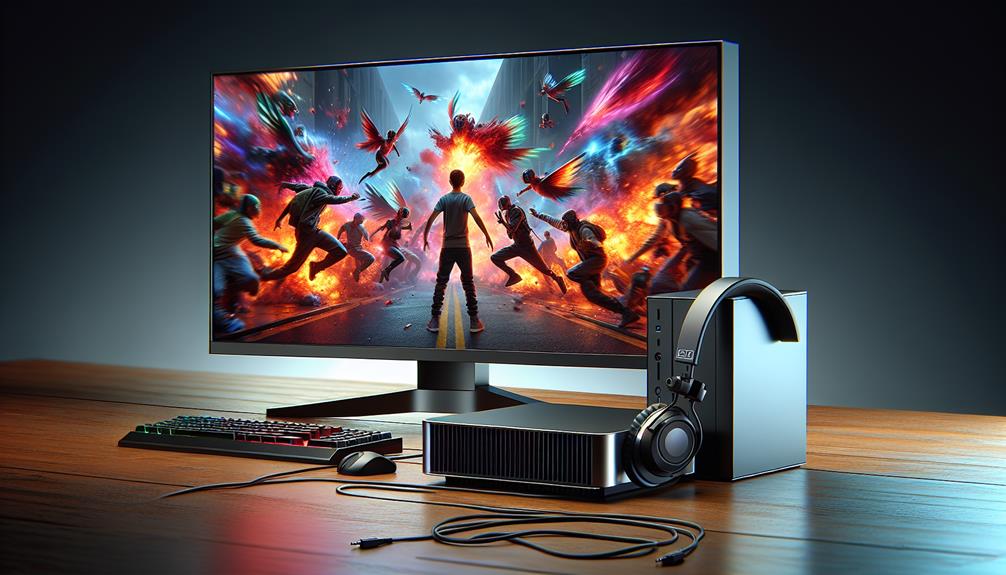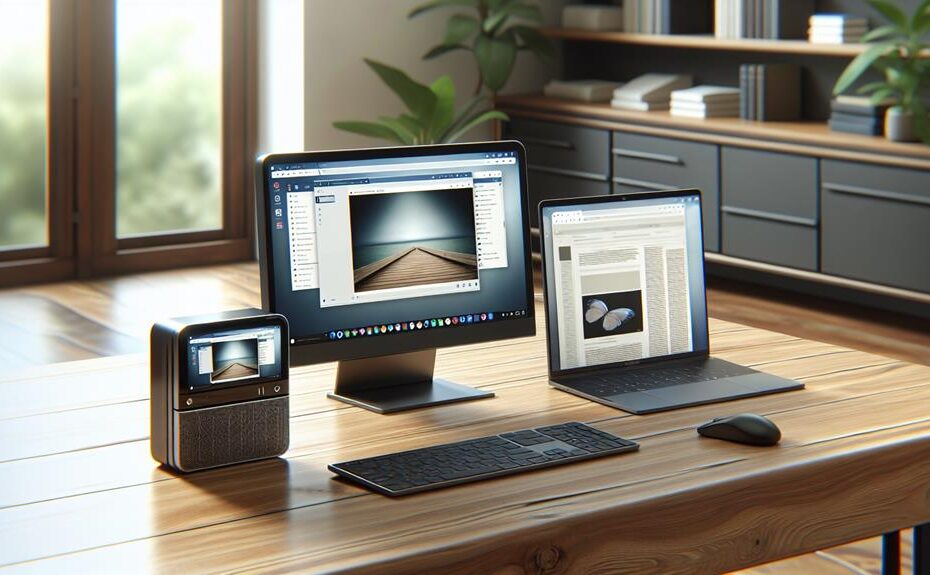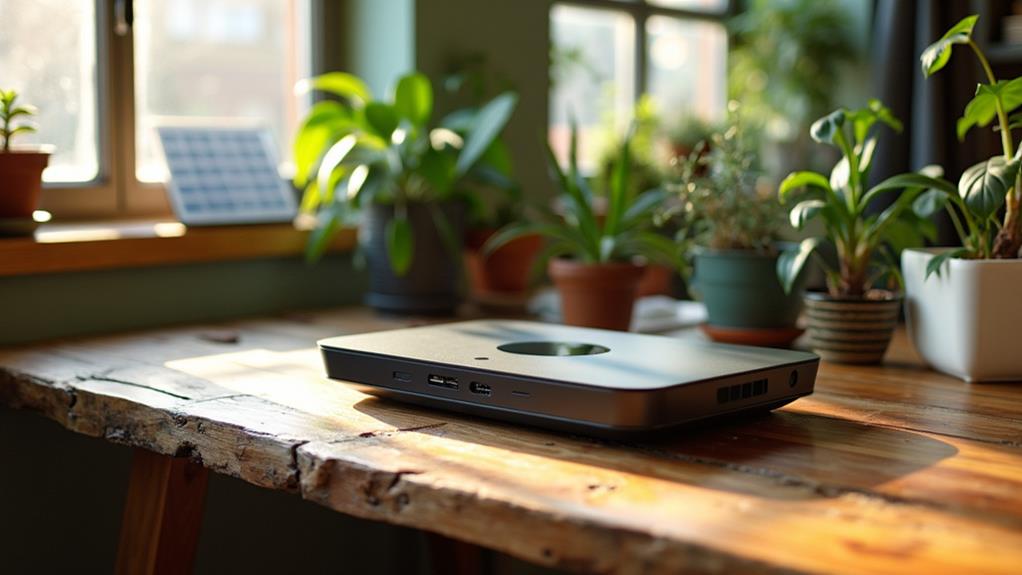



A mini PC can potentially replace a desktop computer based on factors like performance, portability, connectivity, and customization. Consider the processing power, memory, and graphics capabilities for your needs. Mini PCs offer competitive gaming and graphic design advancements with powerful processors and dedicated graphics cards. They excel in space efficiency and portability, ideal for limited desk space. With versatile connectivity options and expandable storage, they cater to various needs. Mini PCs provide multimedia and entertainment capabilities, energy efficiency, software compatibility, and productivity, enhancing user experience. To explore further advantages, investigate the detailed aspects of mini PCs.
Key Takeaways
- Mini PCs can replace desktops for everyday tasks.
- Some mini PCs offer competitive gaming performance.
- Consider processing power, memory, and graphics capabilities.
- Compact design enhances portability and space efficiency.
- Connectivity, upgradability, and customization options available.
Performance Comparison
When comparing the performance of a mini PC to a desktop computer, consider factors such as processing power, memory capacity, and graphics capabilities. Mini PCs have made significant advancements in recent years, offering competitive gaming capabilities and graphic design potential. Gaming capabilities on mini PCs have improved with the integration of powerful processors and dedicated graphics cards. While desktop computers traditionally held the upper hand in gaming performance, many mini PCs now boast similar capabilities, allowing for smooth gameplay on popular titles.
Moreover, mini PCs are increasingly being recognized for their graphic design potential. With options that include high-performance CPUs and GPUs, mini PCs can handle graphic design software with ease. This is particularly beneficial for professionals or enthusiasts looking for a compact yet powerful system for tasks like video editing, 3D modeling, and graphic design. In conclusion, mini PCs have bridged the performance gap with desktop computers, offering notable gaming capabilities and graphic design potential in a smaller form factor.
Portability and Space Efficiency
Considering the need for flexibility and efficiency in your computing setup, exploring the portability and space-saving benefits of mini PCs is essential. Mini PCs offer significant mobility benefits due to their compact design, allowing you to easily move them between different locations or workspaces. Their small footprint contributes to workspace optimization, reducing clutter and maximizing the available space for other activities.
The compact size of mini PCs makes them ideal for individuals with limited desk space or those who prefer a minimalist setup. Whether you work in a small home office, a dorm room, or a shared workspace, a mini PC can fit seamlessly into your environment without occupying too much room. This space efficiency is particularly advantageous for individuals looking to create a clean and organized workspace without sacrificing computing power.
Connectivity Options

The compact design of mini PCs extends to their versatile connectivity options, providing users with a range of ports and interfaces for seamless integration with various devices and peripherals. Mini PCs offer a variety of wireless connectivity options, such as Wi-Fi and Bluetooth, enabling you to connect to networks and wireless peripherals without the need for additional cables. Additionally, these devices often come equipped with multiple USB ports, including the modern USB-C, allowing for fast data transfer and compatibility with a wide range of USB-C peripherals like external drives and monitors.
For those requiring expanded storage capabilities, mini PCs often support expandable storage options, such as SSD or HDD upgrades, providing flexibility to cater to your increasing storage needs. In addition, many mini PCs are designed to support dual monitor setups, offering the possibility of increased productivity through extended screen real estate for multitasking or enhanced viewing experiences. With their diverse connectivity features, mini PCs prove to be versatile solutions for various computing requirements.
Upgradability and Customization
Mini PCs offer users the potential for enhancing their computing experience through upgradability and customization options that cater to individual preferences and evolving needs. One of the key factors to take into account when looking at upgradability is the hardware limitations of the mini PC. While certain components like RAM and storage may be upgradable in some models, other components like the processor or graphics card may have limitations due to the compact size of the device. Understanding these restrictions can help you make informed decisions when contemplating upgrades.
Customization also plays an important role in the long term value of a mini PC. Being able to tailor the device to suit your specific needs can extend its lifespan and guarantee it remains relevant as your requirements change over time. Whether it's upgrading storage for increased capacity or adding external peripherals for expanded functionality, the ability to personalize your mini PC can impact its usability and longevity. Prioritizing upgradability and customization can not only enhance your computing experience but also maximize the value you derive from your mini PC.
Multimedia and Entertainment Capabilities

Enhancing your multimedia and entertainment experience with a Mini PC involves exploring its capabilities beyond traditional computing tasks. When it comes to gaming experience, Mini PCs equipped with powerful processors and dedicated graphics cards can offer a smooth and enjoyable gameplay experience. The compact size of Mini PCs does not compromise on performance, allowing for high frame rates and detailed graphics.
Streaming quality is another area where Mini PCs excel. With support for high-definition video playback and fast internet connectivity options, you can enjoy seamless streaming of your favorite movies, TV shows, and videos without any buffering or lag issues.
In terms of media storage, Mini PCs often come with ample storage options, including solid-state drives (SSDs) and hard disk drives (HDDs), allowing you to store a large collection of multimedia files without worrying about running out of space. Additionally, Mini PCs can be integrated seamlessly into your home theater setup, providing a compact yet powerful solution for your entertainment needs.
Power Consumption and Energy Efficiency
Exploring the power consumption and energy efficiency of Mini PCs reveals their impact on overall performance and environmental sustainability. Mini PCs are known for their power efficiency, consuming markedly less energy compared to traditional desktop computers. This energy-saving feature not only contributes to cost-effectiveness by reducing electricity bills but also minimizes the environmental impact associated with excessive power consumption.
Mini PCs are designed to operate efficiently without compromising performance, making them a sustainable choice for everyday computing tasks. Their compact size and optimized components allow for streamlined energy usage, ensuring that you can enjoy productivity and functionality without unnecessary power consumption. By embracing Mini PCs, you not only benefit from their energy-saving capabilities but also contribute to a greener computing environment. Prioritizing power efficiency in your computing setup can lead to long-term cost savings and a more eco-friendly approach to technology usage. Consider the environmental impact and energy-saving potential of Mini PCs when choosing your next computing device.
Software Compatibility and Productivity

When considering software compatibility and productivity, it is important to assess how efficiently a Mini PC can integrate with your existing applications and enhance your workflow. Mini PCs typically run on popular operating systems like Windows, Linux, or Chrome OS, ensuring broad compatibility with a wide range of software. However, it is essential to verify that specialized programs or industry-specific software you rely on are fully supported on the Mini PC's chosen operating system.
In terms of productivity tools and efficiency, Mini PCs can handle basic office tasks such as word processing, spreadsheets, and internet browsing effectively. They are suitable for running productivity suites like Microsoft Office, Google Workspace, or other cloud-based applications. While Mini PCs may not have the same processing power as traditional desktop computers, they can still support multitasking and light to moderate workloads efficiently.
Consider your specific software requirements and the level of productivity tools you need daily to determine if a Mini PC aligns with your workflow demands.
Price Point and Cost Effectiveness
Considering the price point and cost effectiveness of Mini PCs compared to traditional desktop computers, it is important to evaluate the overall value they offer for your computing needs. Mini PCs generally have a lower upfront cost than traditional desktop computers, making them an attractive option in relation to affordability. However, it's vital to also consider the long-term cost and reliability of these devices. While Mini PCs may be cheaper initially, they could end up costing more in the long run if they require frequent repairs or upgrades due to lower build quality or limited upgradability.
When evaluating the value proposition of Mini PCs, it is essential to weigh their affordability against their performance and durability. Some Mini PCs may offer excellent performance for their size and price, providing a good balance between cost and functionality. However, others may sacrifice reliability for a lower price, leading to potential issues down the line. Hence, it's advisable to research and compare different models to find a Mini PC that not only fits your budget but also meets your reliability and performance requirements.
User Experience and Ergonomics

To assess the user experience and ergonomics of Mini PCs compared to traditional desktop computers, one must evaluate factors such as ease of use and physical design. Mini PCs often provide a more compact and clutter-free workspace due to their smaller size and minimalistic design. This can lead to a more comfortable setup, especially in smaller or shared work areas where space is limited. However, traditional desktop computers offer more flexibility regarding customization and ergonomic accessories. While Mini PCs can be equipped with ergonomic accessories like adjustable monitor stands or ergonomic keyboards, desktop setups typically offer a wider range of compatible accessories to enhance comfort during long hours of use. When it comes to user experience, both Mini PCs and desktop computers can provide a smooth and efficient workflow depending on individual preferences and tasks. Ultimately, the choice between a Mini PC and a desktop computer concerning user experience and ergonomics will depend on the specific needs and setup requirements of the user.
Disclosure: As an Amazon Associate, I earn from qualifying purchases.





